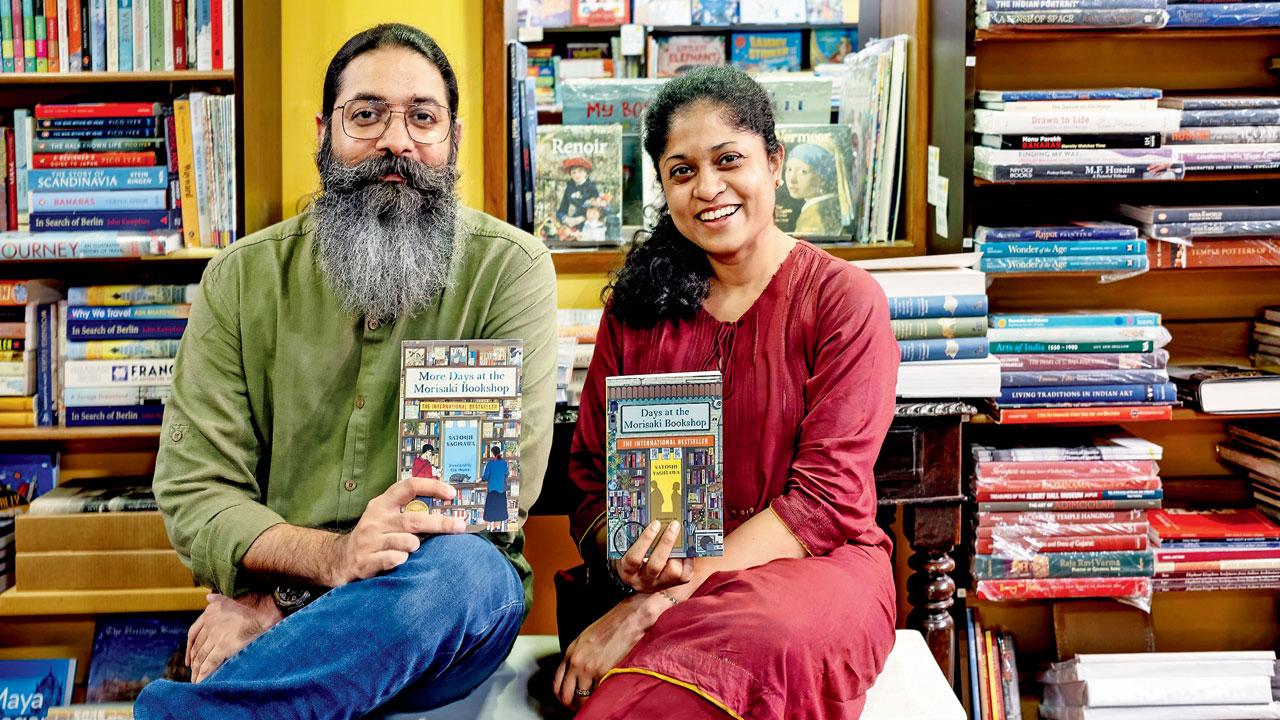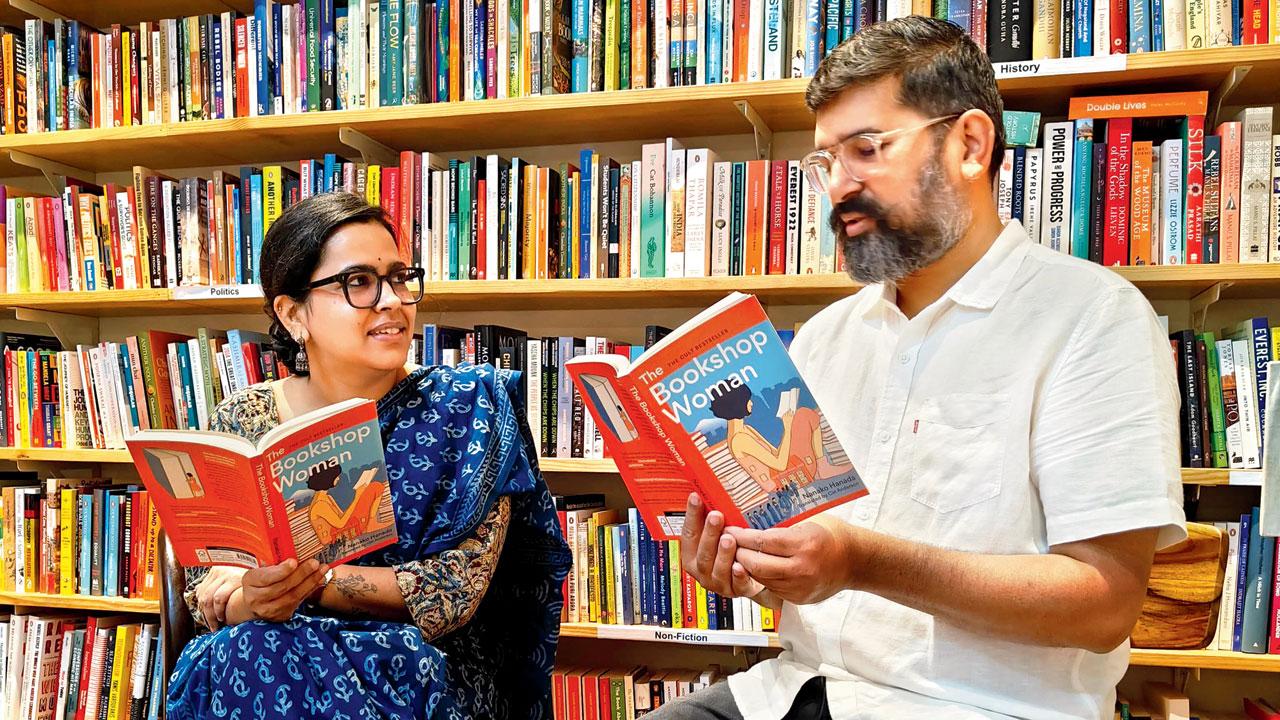Two indie bookstore founders review books about Japan’s intriguing and fascinating reading culture that have crossed over to become global bestsellers

Sidewalk book shelves at a store in Jimbocho book town. Pic courtesy/Wikimedia Commons
Read between the lines
Ahalya Naidu and Meethil Momaya, founders, Trilogy Curated Bookshop and Library, Bandra
ADVERTISEMENT
Satoshi Yagisawa’s Days at the Morisaki Bookshop and its sequel, the recently released, More Days at the Morisaki Bookshop (HarperCollins) are both gently moving, light and quick reads about some of the more common ideas in Japanese literature — loneliness, community, and thoughtfulness.
Both books follow Takako, a woman in her late 20s who nurses her broken heart quite reluctantly (or rather, fortuitously) while living above a three-generation-old, family-run, second-hand bookshop in the real and famous Jimbocho book town in Tokyo.
This girl has all the luck! The warm embrace of family and friends is precious, but to live among bookshops, some of which are centuries old! We looked it up to learn that there are at least 130 second-hand bookshops in Jimbocho that owe their existence to passionate readers and eccentric book collectors. Both books describe the wonderful week-long annual festival in October that draws readers from across the world. Imagine the energy, buzz and joy of celebrating the miracle of stories at such festivals!

Meethil Momaya and Ahalya Naidu at the Bandra bookstore
We were immediately one with Satoru (Takako’s uncle who runs the bookshop), deep in conversation with regulars, dismissing any ideas about taking time off, fretting about missing out on a book haul expedition. Like Takako eventually does, we felt we belonged. The compassionate bond that Satoru shares with his readers reminds us how grateful we are to those who consider our bookshop their safe space. That sense of community and belonging is precious, and within it are an infinite number of stories.
There are stereotypical characters, and after spotting a few inconsistencies and the same phrases several times, it feels as if something deeper is lost in translation (translated by Eric Ozawa). The plot is thin, but that’s not the focus. Like many slice-of-life East Asian contemporary stories, this is about personal growth. Takako heals herself, and helps her uncle, and her friends find peace. Everyone who loves Morisaki Bookshop experiences miracles – the power of literature to change your life and the warm, strong bond that readers share. It dismisses the horrible myth that people no longer enjoy reading.
The ‘Days’ in the title defines a languid sense of time, passing at the right speed to collect our thoughts. An evening in a café can stretch over pages, a hike in the mountains too. Japanese literature has a long, vast, and rich tradition. We are grateful for references to books, poetry and essays that are hallmarks of that unique perspective of experiencing this meditative, introspective, and deeply emotional world.
We would have preferred more book talk and insight about Japanese literature, reading habits and life in the old book town, but realised that like a good bookseller, the author acts as a guide, taking you to starting points, helping you set off on your journey.
P.S.A: You’d be forgiven to believe that cats are mandatory in Japanese stories, especially in bookshops and libraries. Here, although the jackets feature cats, we didn’t find any in both books!
Hooked by the book
Vishal and Neha Pipraiya, founders, Pagdandi Bookstore Cafe, Pashan, Pune
The Bookshop Woman (Hachette India) by Nanako Hanada and translated by Cat Anderson, is another feather in the cap added to the light Japanese genre that celebrates the quirky. What sets this book apart is that it’s non-fiction but reads like fiction. Seen through the lens of everything mentioned in the book having really happened to someone, it allows us to be more patient and understanding of the writer’s motives.

Neha and Vishal Pipraiya
At its heart, the book is about the author standing at a pivotal point in her life where she feels underconfident and directionless about her future. With a crumbling marriage and a bookstore manager job that no longer excites her, she finds succour in making friends on an online matching website and meeting strangers to recommend books to them. What follows is a motley cast of characters that inhabit the pages, and with every person she meets and recommends a book to, the process of her self-discovery moves along the path.
By itself, this might not be a compelling reason to pick it up. What works are the book recommendations made by the author to the people she meets, and her intuitive reading and reasoning of what they might like to read calls out to the bookstore owners in us. Though the recommendations are Japanese author-heavy, one often comes across a much more international recommendation which any bibliophile should immediately connect with. In fact, one such instance of coming across a reader who knows or has read everything the author has to suggest but finally triumphing with a recommendation the reader did not know about and still felt interested in, was like a homecoming for us.
Another theme that runs parallel is the different personalities she encounters. Products of Japanese urban life, its culture, and urban sprawl, the people she meets, their motivations, desires, and regrets are succinctly described and keep the pages turning. Though we wouldn’t put this on the must-read list of anyone because, come on, it’s a Japanese book with not a single mention of a cat in it. Jokes apart, if you are in the mood for a breezy, satisfying and light read that would recommend further names to your booklist, and also give you a glimpse into the “life in a metro” of Japan, you can take this one home.
 Subscribe today by clicking the link and stay updated with the latest news!" Click here!
Subscribe today by clicking the link and stay updated with the latest news!" Click here!







